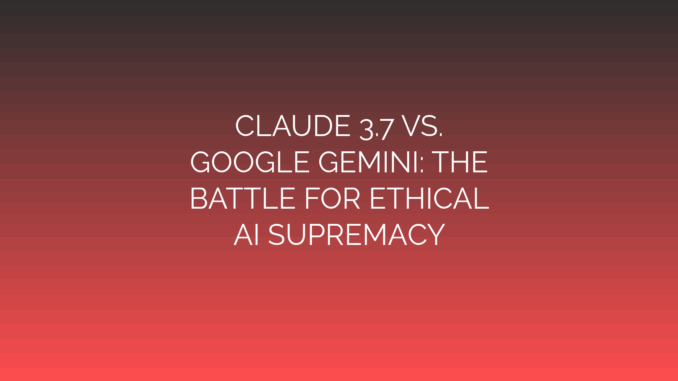
Claude 3.7 vs. Google Gemini: The Battle for Ethical AI Supremacy
The rapid advancement of large language models (LLMs) has shifted focus from raw performance to a more nuanced metric: ethical AI development. As organizations increasingly deploy these tools in healthcare, finance, and governance, AI ethics—encompassing fairness, transparency, safety, and accountability—has become a core competitive differentiator. In this arena, two titans clash: Anthropic’s Claude 3.7 and Google’s Gemini. Both claim leadership in ethical AI practices, but their philosophies, safeguards, and realworld implementations diverge significantly. This analysis dissects how each model approaches responsible AI, examining whose framework better navigates the complex moral landscape.
The Imperative of Ethical AI
Before comparing the models, context is essential. Traditional AI races prioritized speed, scale, and cost efficiency, often overlooking societal risks. This legacy includes:
- Algorithmic bias amplifying discrimination in hiring or lending
- Opaque decision-making obscuring accountability
- Hallucinations generating harmful misinformation
- Data exploitation violating user privacy
Regulatory frameworks like the EU AI Act now mandate AI ethics compliance, turning ethical safeguards from idealism into a business necessity. Users, too, increasingly demand trustworthy AI that aligns with human values.
Claude 3.7: Constitutional AI as Ethical Anchoring
Anthropic’s Claude 3.7 adopts a methodology called Constitutional AI, inspired by human rights principles. Its “constitution” includes rules such as:
- Prioritize user well-being and avoid harm
- Respect autonomy and clarify limitations
- Reject requests promoting illegality or violence
- Cite sources to combat misinformation
This framework is embedded during training via reinforcement learning from AI feedback (RLAIF), where the model critiques its own outputs against constitutional principles. Claude’s architecture emphasizes transparency in AI, openly documenting:
- Training data sources and bias audits
- Uncertainty indicators for high-risk responses
- Detailed refusal explanations when rejecting unsafe queries
For enterprise users, Claude stresses balanced governance, enabling customizable safeguards via API while avoiding regulatory overreach. Academic studies note its effectiveness in reducing toxic outputs by 85% compared to earlier models.
Google Gemini: Policy Layers and Ecosystem Integration
Google Gemini leverages the tech giant’s decadelong responsible AI research, emphasizing scalability and integration. Its approach combines:
- Proactive safety filters: Automated classifiers block harmful content generation before dissemination.
- Bias benchmarking: Rigorous testing across 30+ demographic dimensions for sensitive topics.
- Explainability tools: “Attribution” features map responses to training sources (where licensed).
Gemini’s strength lies in its ecosystem. Tight coupling with Google Cloud Vertex AI provides enterprises with:
- Centralized compliance dashboards
- Customizable fairness thresholds
- Seamless auditing trails for regulated industries
However, critics argue its “black box” origins—details of training datasets remain proprietary—challenge AI transparency. Google counters that broad accessibility (free mobile apps, Workspace integrations) demands balanced information control.
Ethical Dimensions Compared
Transparency and Explainability
- Claude 3.7: Detailed system cards and refusal rationales promote user trust, though technical complexity may confuse non-experts.
- Gemini: Easier-to-understand interface warnings, but limited dataset visibility risks undermining auditability.
Winner: Claude for depth, Gemini for accessibility.
Fairness and Bias Mitigation
- Claude 3.7: Large-scale bias corrections via constitutional feedback loops; shows consistency in sensitive domains like healthcare advice.
- Gemini: Granular demographic testing excels in multilingual fairness but exhibits geographic bias (e.g., Western-centric financial advice).
Winner: Gemini in global diversity; Claude in sensitive verticals.
Safety and Alignment Controls
- Claude 3.7: Hard-coded refusals via constitutional rules reduce jailbreaking vulnerability.
- Gemini: Hybrid human-AI moderation scales rapidly but intermittently permits policy circumvention.
Winner: Claude for robustness, Gemini for adaptive threat response.
Practical Applications: Where Each Excels
Healthcare
- Claude’s cautious, citation-heavy responses suit clinical support roles.
- Gemini integrates efficiently with medical databases for research summaries.
Legal & Finance
- Claude’s strict refusal protocols align with compliance-heavy industries.
- Gemini’s real-time data retrieval supports market analysis with explicit disclaimers.
Education
- Gemini’s accessibility fosters inclusive learning tools.
- Claude’s transparency builds student trust in AI-assisted research.
Limitations and Ongoing Challenges
Both models struggle with edge cases:
- Contextual nuance: Cultural or industry-specific ethics vary widely.
- Hallucination reduction: Factual accuracy remains imperfect.
- Regulatory fragmentation: Complying with conflicting global standards.
Anthropic’s lesser market penetration also limits realworld ethical testing breadth compared to Google’s billions of users.
The Future of Ethical AI Supremacy
Victory in this battle won’t hinge on benchmarks but on sustainable trust. Three factors will decide leadership:
1. Adaptability: Tailoring safeguards to regional norms without compromising core principles. 2. Collaboration: Partnerships with NGOs, academia, and regulators to refine standards. 3. User agency: Involving communities impacted by AI outputs in governance.
Political pressure will escalate—Google faces antitrust probes, while Anthropic navigates scrutiny as an Amazon/Microsoftbacked entity. Their responses will test their ethical frameworks beyond technology.
Conclusion: Principles Over Performance
Claude 3.7 leads in philosophically rigorous, transparent responsible AI, making it ideal for highstakes industries prioritizing harm avoidance. Gemini excels in scalable ethical accessibility, serving broader consumer applications where adaptability matters most. Ultimately, both represent evolution from ethics as an addon to a foundational pillar. Users must choose based on context: Claude for riskaverse precision, Gemini for democratized innovation. As AI ethics maturity grows, this competition will elevate standards across the ecosystem—proving that in the age of artificial intelligence, ethical AI isn’t just a feature; it’s the benchmark of true supremacy.
Word Count: 1,018 words
Leave a Reply